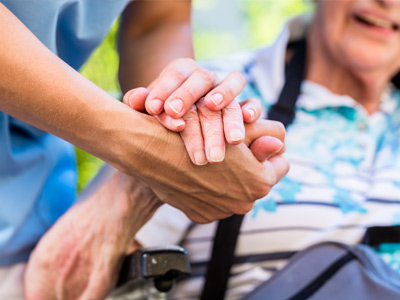Latest News from Everycare
 All home care workers looking after old and vulnerable people in their own homes are now being offered weekly coronavirus tests, the government has announced .
All home care workers looking after old and vulnerable people in their own homes are now being offered weekly coronavirus tests, the government has announced .
Those working for CQC registered providers will receive weekly PCR tests to administer at home, which will help identify more asymptomatic cases and protect care users who are more vulnerable to the virus.
All registered home care agencies will be contacted with details of how to apply for test kits for their care workers next week.
Home care agencies are responsible for ordering and distributing tests to all home care workers for them to conduct at home on a weekly basis, testing on a Thursday, Friday, Saturday or Sunday. This approach will maximise the capacity available in all laboratories.
A month’s worth of test kits will be delivered to care providers directly who can distribute tests to their staff using the same channels used to distribute PPE.
‘Home care workers have not been able to access the same level of testing as their colleagues working in care homes’
Minister for Care, Helen Whately said: “Home care workers have been doing an incredible job throughout the pandemic, caring day in and day out and going the extra mile to keep people they care for safe from COVID.
“As our testing capacity continues to expand, I’m glad we’re able to take this next step and make regular testing available to homecare workers. Now, as well as having PPE, home care workers will be able to take a weekly test to check they don’t have Coronavirus.
To read the full story visit the homecare.co.uk website.
 Care home residents and those on the government’s new shielding list are among the 2.5 million people in England being offered free vitamin D pills this winter, the government has announced.
Care home residents and those on the government’s new shielding list are among the 2.5 million people in England being offered free vitamin D pills this winter, the government has announced.
As well as care homes, others on the government’s new ‘clinically extremely vulnerable’ list (which comes into effect from 2 December) will be sent a letter asking if they would like four months’ worth of supplements delivered to their homes from January.
With more people with serious health conditions and care home residents having spent more time indoors shielding from COVID-19 during the pandemic, the government has acknowledged there is a higher risk of vitamin D deficiency in these groups of people.
‘May increase the risk of falls in older people’
Public Health England (PHE) and National Institute for Health and Care Excellence (NICE) are reviewing the evidence on vitamin D and COVID-19.
In a joint statement PHE and NICE stated: ‘Vitamin D is needed for healthy bones and muscles. Everyone is advised to take a supplement of vitamin D during winter months.
‘Too little vitamin D can lead to bone problems such as rickets in children, and bone pain and muscle weakness in adults, which may also increase the risk of falls in older people.
‘There have been some reports about vitamin D potentially reducing the risk of coronavirus (COVID-19). As yet there is insufficient evidence to prove that it helps people respond to COVID-19, but as more evidence is accumulated, our understanding may change.
‘There are also trials underway which we are keeping a close eye on.’
82% of people hospitalised with COVID-19 were vitamin D deficient.
To see the full story visit the homecare.co.uk website
 The chief executive of United Kingdom Homecare Association (UKHCA) has criticised the government over the lack of testing and costs of PPE, accusing them of being ‘disinterested in the 715,000’ care workers during the pandemic.
The chief executive of United Kingdom Homecare Association (UKHCA) has criticised the government over the lack of testing and costs of PPE, accusing them of being ‘disinterested in the 715,000’ care workers during the pandemic.
In her open letter to Stuart Miller, director of Adult Social Care Delivery at the Department for Health and Social Care, Dr Jane Townson expresses her concerns with the lack of information to home care providers and how she is ‘frustrated by the focus of politicians on care homes,’ saying the only message for home care providers was to ‘follow government guidance on PPE’.
Her letter is in response to the missive from the Department for Health and Social Care warning care providers that the UK is experiencing a rise in confirmed COVID-19 cases.
She states: ‘If the government is serious about minimising the spread of COVID19 among the care workforce and those they support in communities, it needs to fully fund the cost of PPE for care workers and ensure there is availability and accessibility of antigen testing as required for the home care workforce as well as for those in care homes.’
Dr Townson has asked the government for an explanation into lack of testing after reports by officials to meetings UKHCA had attended made it clear ‘inadequate laboratory capacity for testing’ is the reason for a lower prioritisation of testing in homecare.
The government said UK laboratory daily testing capacity was more than 370,000 last week
She added routine testing is not available for home care workers in areas where there are lockdowns and it was ‘unacceptable’ some areas are ‘experiencing a fast and efficient service’ for testing while others are being directed hundreds of miles away and having to ‘wait days for results’.
For the full story visit the homecare.co.uk website.
 The government is to spend £588 million on helping people who require domiciliary care or care home support after being discharged from hospital.
The government is to spend £588 million on helping people who require domiciliary care or care home support after being discharged from hospital.
The funding is part of a three-billion pound package provided to protect and prepare health and social care in the event of a second peak of COVID-19, during the coming winter months, and follows a £1.3bn funding made available via the NHS to support the discharge process in March.
From 1 September, the NHS will make a comprehensive care and health assessment for any ongoing care needs, including determining funding eligibility. This will provide up to six weeks of funded care following discharge from hospital.
The government also said NHS Continuing Healthcare (NHS CHC) assessments will restart from September, ensuring those with complex health needs can continue to access the care they need for free.
’The road to recovery is quicker’ when receiving care ‘in the comfort of home’
Health and Social Care Secretary, Matt Hancock, said: “We know for the majority of people the road to recovery can be quicker when they receive care and support in the comfort of their own home.
“This funding will help ensure people can be safely discharged from hospital knowing they will get the vital follow-on care they need to recover fully from treatment.
“We’re also making sure those with complex health needs continue to receive the best support possible in the community.”
The department states most people will be discharged back to their homes, however, they anticipate a very small proportion will need, and benefit from, short or long term residential, nursing home or hospice care.
The government added, no-one should be discharged from hospital directly to a care home without the involvement of the local authority.
All patients are required to be tested prior to discharge to a care home and no care home should be forced to admit an existing or new resident who has tested positive for coronavirus if the home would be unable to cope with the impact of their illness.
For more information visit the homecare.co.uk website
 All home care workers looking after old and vulnerable people in their own homes are now being offered weekly coronavirus tests, the government has announced .
All home care workers looking after old and vulnerable people in their own homes are now being offered weekly coronavirus tests, the government has announced .



